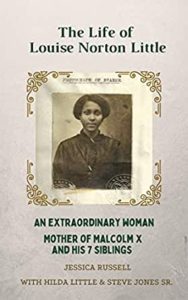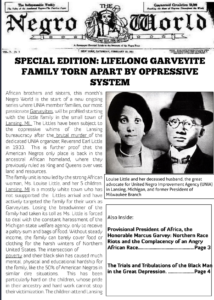|
Getting your Trinity Audio player ready...
|
Reading Time 4 mins
March 31, 2021
Raising Malcolm X: Louise Langdon Norton, Malcolm’s Grenadian Mom (Part I)*
 Malcolm X’s contributions to American civil and political rights and pan-African causes are well-known. What is not sufficiently highlighted in the many narratives about Malcolm X is the role of his parents, particularly his very educated activist Grenadian mother who nurtured him and imbued in him a lifelong political and ethical skill set, the basis of a political education that would inform his future direction.
Malcolm X’s contributions to American civil and political rights and pan-African causes are well-known. What is not sufficiently highlighted in the many narratives about Malcolm X is the role of his parents, particularly his very educated activist Grenadian mother who nurtured him and imbued in him a lifelong political and ethical skill set, the basis of a political education that would inform his future direction.
In 1917, Louisa Langdon Norton, a young Grenadian girl, migrated to Canada to live with her uncle in Montreal. Two years later, Louise met Earl Little, a fiery Baptist preacher, at a Universal Negro Improvement Association-African Communities League conference, the organization founded by Marcus Garvey. Louise and Earl became leading members of the The Universal Negro Improvement Association and African Communities League (UNIA-ACL). Louise Little’s articles were often published in The Negro World, the Garveyite newspaper.
Moving to the United States shortly thereafter, they would marry on May 10, 1919. A few years later, the couple gave birth to a little boy who would eventually take the name Malcolm X (1925-1965).
Louisa (popularly known as “Louise‟) was born in 1897 and was raised by her maternal grandmother, Mary Jane Langdon. The Grenada Louise left during World War I was one of few opportunities in employment and education, resulting in massive emigration. Only a quarter of school-age children were enrolled.
It was during the decade that Louise left Grenada that emigration first affected the natural population increases on the island. Between 1911 and 1921, 12,045 people emigrated – the highest volume since slavery. While 70% of all immigrants were male, there was also growing demand for females, mostly domestic workers. Grenadian emigrants went to virtually every corner of the Americas and the United Kingdom.
Louise was a proud black woman with a clear understanding and commitment to black liberation.
Louise and Earl were active in Marcus Garvey’s (1887- 1940) Universal Negro Improvement Association (UNIA). Louise was not just a strong black woman who kept her family together during racist terror; she was a reporter of precision, an outstanding political strategist, pan-Africanist and anti-racist campaigner.
Malcolm X recounts in Autobiography of Malcolm X that, though his father was more vocal, his mother was much more educated and that she portrayed a tendency to “correct” her husband. According to Malcolm’s latest biographer, Manning Marrable [May 13, 1950 – April 1, 2011 ] (Malcolm X: A Life of Reinvention), “unlike Earl, Louise had received an excellent Anglican elementary-level education from Grenada, becoming a capable writer as well as fluent in French.”
In addition to her militancy, Louise’s features would often pose an additional danger as some white supremacists would have mistakenly targeted her as a white woman with a black man. It is instructive that though Louise could have crossed the racial barrier and escape as “white,‟ her Grenadian upbringing made her a proud black woman.
Malcolm recalls in the Alex Haley autobiography that his mother attributed her father’s liaison with his grandmother as rape, which is understandable considering the power equation and the then girl’s age. However in Jan Carew’s “Ghost in Our Blood,” the writer provides a more nuanced take after interviewing Louise‟s relatives in LaDigue, Grenada. According to Carew, the relatives indicated that mother Langdon’s relationship with Mr. Norton was consensual, except that the man was reportedly “not involved in his daughter‟s birth.”
Louise once hid Marcus Garvey when he was on the run. And upon Garvey’s incarceration on Federal charges in 1925, the Littles petitioned for his release, even writing directly to President Calvin Coolidge.
 While Earl was President of the local UNIA, Louise served as secretary. Though the common role for assertive women of the era was stereotypical, Louise‟s UNIA secretarial duties were far more than mere note taker. Louise wrote reports documenting the organization’s activities and division meetings for UNIA’s organ – The Negro World at the time with a global reach of close to half a million. She was also central in planning events and carried out key organizational duties.
While Earl was President of the local UNIA, Louise served as secretary. Though the common role for assertive women of the era was stereotypical, Louise‟s UNIA secretarial duties were far more than mere note taker. Louise wrote reports documenting the organization’s activities and division meetings for UNIA’s organ – The Negro World at the time with a global reach of close to half a million. She was also central in planning events and carried out key organizational duties.
Louise‟s eldest son Wilfred recalls that African American and Caribbean newspapers were read at home and that the children were regularly educated about current affairs in the Caribbean and Africa. The West Indian newspaper, edited by the Caribbean foremost Federationist, T.A. Marryshow, began publishing in 1915, made its way to the Little’s home. This infusion of Pan-Africanism was a deliberate effort by conscious parents to provide the basis for the children’s future direction.
By the accounts of people who knew her best, Louise was a proud black woman with a clear understanding and commitment to black liberation. In Autobiography, Malcolm recounts that his parents would take him to UNIA meetings held secretly in different people’s homes. According to Jan Carew [September 24, 1920 – December 6, 2012 ] (Fulcrums of Change), Louise once hid Marcus Garvey when he was on the run. And upon Garvey’s incarceration on Federal charges in 1925, the Littles petitioned for his release, even writing directly to President Calvin Coolidge.
To understand Louise’s heroism, it is necessary to appreciate the social and political situation of the 1920s and 30s. The US that Louise encountered, and Louise’s resistance to racist terror eventually took a toll on the family, including her mental health. An important unfinished project would be how the Caribbean and American governments can explore this generation can appropriately recognize this pan-Africanist heroine in a manner befitting her exemplary contribution to human rights and black self-determination and human rights.
* This article is first in a series by the author unearthing the revolutionary spirit that forged this central figure in the Black Liberation struggles of the 20th century. First published in Everybody’s Magazine, November 2011, this installment is slightly edited.
Martin P. Felix, co-editor of Big Drum Nation, is a visual artist and educator. He lives with his family in New York City.
